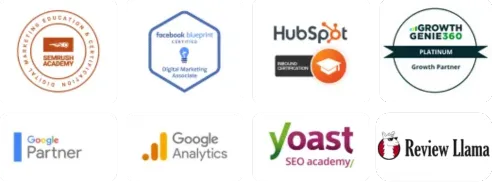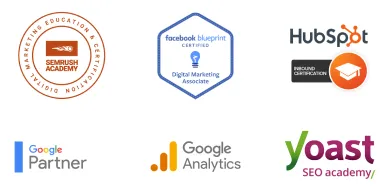TO LEARN IS TO GROW
Learning Center
We do our research and publish our results. Should probably call this the Growing Center.


9 Local SEO Tips and Tricks For Business Owners
Search engine optimization might sound complicated for a small business owner, we know, but a few local SEO tips and tricks can get you set up and open the doors to a whole new world of digital marketing for you.
Small businesses tend to overlook the benefits of local SEO in their business growth. Data shows that a whopping 46% of searches on Google are geo-targetted.
Remember when you last searched for a new cafe in your neighborhood or a Thai restaurant near Hollywood? That’s what geo-targeting search means.
The key to an effective local SEO strategy is in the details. You have to dive deep into your brand before choosing what strategies will work best for you and your goal.
Spoiler Alert: If you haven’t maximized your Google My Business (GMB) page, we urge you to start on it immediately because this list involves a lot of Google My Business tweaking.
In fact, you can read more about that here: “Why Is It Important to Optimize My Google My Business Listing?”
With that, we now lay down nine useful local SEO tips, tools, and tactics for small businesses to get ahead of the Local Pack:

1. Check Where Your Google Traffic Comes From
Once you’ve set up your Google My Business page, you will have access to an Insights feature on the leftmost side of the screen.
GMB Insights goes so far as telling you that traffic comes from either direct (users directly searched for your brand’s name), discovery (users searched for services or products that are related to your brand), or branded (users finding your page by searching for other brands).
On the other hand, Google Analytics shows the data as organic. If you want to see exactly where the traffic comes from, you have to build a custom URL link.
Use Campaign URL Builder to find out exactly if the clicks came from Facebook, Google search, Twitter, etc.
Just fill out the necessary details to build a custom URL, once you publish the content online, you should be able to look into the exact numbers that each platform brings in.
This data is useful in restrategizing on the area that needs improvement. For example, if the majority of website traffic comes from Facebook but you have rich content on YouTube, you can cross-promote your YouTube content on Facebook.
2. Add More Categories On Google My Business To Increase Searchability
Google allows one category to show on your profile search result but you can add more than 10 as hidden categories that boosts your page’s ranking on discover searches.
For instance: when you search for LOJO Marketing on Google, our main category shows as Marketing Agency.
To increase the chances of website traffic through categories, find the best keyword variations using the local pack’s hidden category page.
To do this, search for different keyword variations until you list 3-5 brand names that consistently show up on every search.
Next, choose a brand from your list, search for them on Google, click on Maps then right-click on your mouse.
Choose View Page Source, then an HTML code of the page will appear. Click Ctrl+Find or Command+F and type their primary category, every keyword after that is their hidden categories.
Make an inventory of the keywords, pick the most used keywords, and use it as your hidden categories.
3. Remove/Report Keyword Spammers On Google Search
Have you seen a brand from the local pack who uses this format “LOJO Marketing | Internet Marketing Service”?
This format ranks them higher within the search results but the truth is, it is actually against Google’s terms and conditions.
What you can do is to go to their Google Maps listing, click “Suggest an edit” and input their proper business name without the keyword.
Google will then review your edit and in a few days, expect their name to be changed. Easy, isn’t it?
4. Use Images to Improve Ranking
If you have a business that does not have on-site activity — a home service massage, an online tutor, etc., geo-tagging may be a problem because your service is not tied to a specific location.
But don’t worry, we still have a few local SEO tips and tricks up on our sleeves.
Choose your “in action” photos and rename the files into a brand + keyword format. For example, use “Web designing brainstorm at LOJO Marketing HQ.jpeg” instead of the normal IMG334.jpeg.
Do this for all photos, save the files in JPEG format then head on to this geo-tagging tool website.
Upload the photos on the website then open a different tab on your Google Maps listing. Drag the uploaded photos to your listing’s pin location.

5. Get Featured on Local Websites
To put this into perspective, the more backlinks you get, the more Google thinks that you are reliable enough to be ranked higher in page results.
Now the problem is, how can you find websites that are willing to sponsor your link on their page?
The answer is simple really, you just ask. But do it strategically — ask the right websites. Find the right websites using this hack:
Type intitle: sponsors “name of your city”
Once the results come in, click on the URL and add &num=100 to make Google display 100 results instead of just 10 results
Download the MozBar toolbar to turn the results in a csv file
Reach out to these brands through a simple email saying something like, “Hey, I’d love to be part of your advocacy! I would really appreciate a mention on your website to have exposure to the local scene. Have a nice day and thank you!”
By doing so, you’ll rank higher because the backlinks from local websites give your brand a local’s preference edge.
6. Get Keyword-Rich Customer Reviews
When was the last time you bought a product without looking for feedback on the internet?
An average consumer relies heavily on online reviews before purchasing a product, and additionally, these reviews can also be your ticket to ranking higher.
Ironically, the first step in this hack is, don’t ask for reviews. Asking for one feels like a burden to some consumers, and you don’t have control over where they post it and what they are going to say on it.
Instead, survey your customers.
Your survey form/questions should include a contact number or email and the questions.
Control the answers by controlling the questions. Then, select the best reviews and tweak it with your preferred keywords.
For example, instead of “LOJO has helped me improve my website!” put, “LOJO Marketing helped improve the web design on my page!”
Reach out to your customer with revised keyword-rich reviews and a link that will take them to the Write a Review page.
And voila! You now have keyword-rich reviews on your listing.

7. Put Star Ratings Within the Google Search Result
Displaying star ratings within the Google search result gives you an edge over the local pack.
(Your listing just stands out more that way, as you can see.)
It directs the user’s eye to your listing and provides validation to your name as a brand.
There’s the hard way and the easy way, and both reaps the same benefits.
So, we go the easy way. To start, go to the Rich Plug-ins website and scroll down to see the free plugin as seen here:
Embed a Google Review widget on any page on your website, enable Rich Snippets, and start seeing those shining stars on your brand’s Google search results!
8. Rank Higher By Sending E-mails
So, you have a large email marketing database and you want to use it to improve your Google ranking. Impossible? We dare say no.
Here’s a little trick that’s so simple you can do it in minutes.
On your email signature, replace the embedded link on your brand name with a hyperlink of the Google search page result of your brand.
In that way, when a user clicks on the link, it will register as a Google search. It sends a message to Google that users are searching for your brand.
TOPIC SELECTION
9 Local SEO Tips and Tricks For Business Owners
Eric Lay /// August 26, 2020
Search engine optimization might sound complicated for a small business owner, we know, but a few local SEO tips and tricks can get you set up and open the doors to a whole new world of digital marketing for you.

Small businesses tend to overlook the benefits of local SEO in their business growth. Data shows that a whopping 46% of searches on Google are geo-targetted.
Remember when you last searched for a new cafe in your neighborhood or a Thai restaurant near Hollywood? That’s what geo-targeting search means.
The key to an effective local SEO strategy is in the details. You have to dive deep into your brand before choosing what strategies will work best for you and your goal.
Spoiler Alert: If you haven’t maximized your Google My Business (GMB) page, we urge you to start on it immediately because this list involves a lot of Google My Business tweaking.
In fact, you can read more about that here: “Why Is It Important to Optimize My Google My Business Listing?”
With that, we now lay down nine useful local SEO tips, tools, and tactics for small businesses to get ahead of the Local Pack:
Table of Contents

Local SEO Fun Fact: 97% of people learn more about a local company online than anywhere else.
(Source: “60+ SEO Statistics to Help You Rank #1 in 2020” by SEO Tribunal)
1. Check Where Your Google Traffic Comes From
Once you’ve set up your Google My Business page, you will have access to an Insights feature on the leftmost side of the screen.
GMB Insights goes so far as telling you that traffic comes from either direct (users directly searched for your brand’s name), discovery (users searched for services or products that are related to your brand), or branded (users finding your page by searching for other brands).
On the other hand, Google Analytics shows the data as organic. If you want to see exactly where the traffic comes from, you have to build a custom URL link.
Use Campaign URL Builder to find out exactly if the clicks came from Facebook, Google search, Twitter, etc.
Just fill out the necessary details to build a custom URL, once you publish the content online, you should be able to look into the exact numbers that each platform brings in.
This data is useful in restrategizing on the area that needs improvement. For example, if the majority of website traffic comes from Facebook but you have rich content on YouTube, you can cross-promote your YouTube content on Facebook.

A screenshot of the Campaign URL Builder function of Google Analytics.
2. Add More Categories On Google My Business To Increase Searchability
Google allows one category to show on your profile search result but you can add more than 10 as hidden categories that boosts your page’s ranking on discover searches.
For instance: when you search for LOJO Marketing on Google, our main category shows as Marketing Agency.
To increase the chances of website traffic through categories, find the best keyword variations using the local pack’s hidden category page.
To do this, search for different keyword variations until you list 3-5 brand names that consistently show up on every search.
Next, choose a brand from your list, search for them on Google, click on Maps then right-click on your mouse.
Choose View Page Source, then an HTML code of the page will appear. Click Ctrl+Find or Command+F and type their primary category, every keyword after that is their hidden categories.
Make an inventory of the keywords, pick the most used keywords, and use it as your hidden categories.


A screenshot of the “View Page Source” function that lets you find hidden categories that you might also want to use.

3. Remove/Report Keyword Spammers On Google Search
Have you seen a brand from the local pack who uses this format “LOJO Marketing | Internet Marketing Service”?
This format ranks them higher within the search results but the truth is, it is actually against Google’s terms and conditions.
What you can do is to go to their Google Maps listing, click “Suggest an edit” and input their proper business name without the keyword.
Google will then review your edit and in a few days, expect their name to be changed. Easy, isn’t it?
4. Use Images to Improve Ranking
If you have a business that does not have on-site activity — a home service massage, an online tutor, etc., geo-tagging may be a problem because your service is not tied to a specific location.
But don’t worry, we still have a few local SEO tips and tricks up on our sleeves.
Choose your “in action” photos and rename the files into a brand + keyword format. For example, use “Web designing brainstorm at LOJO Marketing HQ.jpeg” instead of the normal IMG334.jpeg.
Do this for all photos, save the files in JPEG format then head on to this geo-tagging tool website.
Upload the photos on the website then open a different tab on your Google Maps listing. Drag the uploaded photos to your listing’s pin location.

Local SEO Fun Fact: 72% of consumers that did a local search visited a store within five miles of where they were searching. 61% of mobile searchers are more likely to contact a local business if they have a mobile-friendly site.
(Source: “The Ultimate List of Marketing Statistics for 2020” by Hubspot)
5. Get Featured on Local Websites
To put this into perspective, the more backlinks you get, the more Google thinks that you are reliable enough to be ranked higher in page results.
Now the problem is, how can you find websites that are willing to sponsor your link on their page?
The answer is simple really, you just ask. But do it strategically — ask the right websites. Find the right websites using this hack:
Type intitle: sponsors “name of your city”
Once the results come in, click on the URL and add &num=100 to make Google display 100 results instead of just 10 results
Download the MozBar toolbar to turn the results in a csv file
Reach out to these brands through a simple email saying something like, “Hey, I’d love to be part of your advocacy! I would really appreciate a mention on your website to have exposure to the local scene. Have a nice day and thank you!”
By doing so, you’ll rank higher because the backlinks from local websites give your brand a local’s preference edge.
6. Get Keyword-Rich Customer Reviews
When was the last time you bought a product without looking for feedback on the internet?
An average consumer relies heavily on online reviews before purchasing a product, and additionally, these reviews can also be your ticket to ranking higher.
Ironically, the first step in this hack is, don’t ask for reviews. Asking for one feels like a burden to some consumers, and you don’t have control over where they post it and what they are going to say on it.
Instead, survey your customers.
Your survey form/questions should include a contact number or email and the questions.
Control the answers by controlling the questions. Then, select the best reviews and tweak it with your preferred keywords.
For example, instead of “LOJO has helped me improve my website!” put, “LOJO Marketing helped improve the web design on my page!”
Reach out to your customer with revised keyword-rich reviews and a link that will take them to the Write a Review page.
And voila! You now have keyword-rich reviews on your listing.
Beyond all these local SEO tips, you’ll also likely want to brush up on your regular search engine optimization. Bottom line: it pays to nail down both your Local SEO and your regular SEO. Read “How is LOCAL SEO Different from Regular SEO?”.

Local SEO Fun Fact: Local searches result in purchases 28% of the time.
(Source:”The Importance of Local Search Engine Marketing (Statistics and Trends)” by Go-Gulf)
7. Put Star Ratings Within the Google Search Result
Displaying star ratings within the Google search result gives you an edge over the local pack.
(Your listing just stands out more that way, as you can see.)
It directs the user’s eye to your listing and provides validation to your name as a brand.
There’s the hard way and the easy way, and both reaps the same benefits.
So, we go the easy way. To start, go to the Rich Plug-ins website and scroll down to see the free plugin as seen here:

Embed a Google Review widget on any page on your website, enable Rich Snippets, and start seeing those shining stars on your brand’s Google search results!

8. Rank Higher By Sending E-mails
So, you have a large email marketing database and you want to use it to improve your Google ranking. Impossible? We dare say no.
Here’s a little trick that’s so simple you can do it in minutes.
On your email signature, replace the embedded link on your brand name with a hyperlink of the Google search page result of your brand.
In that way, when a user clicks on the link, it will register as a Google search. It sends a message to Google that users are searching for your brand.
9. How to Rack Up Engagements
This one’s a no-brainer but it can only be applied to certain brands.
Some brands put an emoji next to their name to provide more visibility on the search results.
In this image, we can see that only one from their pack has an emoji.
It fits their brand voice and works to their benefit but it is entirely up to you if you want to apply this strategy.
Take note that brands with a more serious persona are better off without this hack.
Bonus Tip: Contact Google Customer Service
Even with the rich internet content on how-to’s and DIYs, there are some instances that we need a Google representative to assist us.
Surprisingly, the fastest way to reach them is not through the official customer service email address or hotline, but through Facebook or Twitter. The reason behind this is that the social media managers are the representatives who can directly approve your requests and take actions versus the customer service department which is outsourced from another country.
So, the next time you need something from Google, just slide through their DMs and expect a faster response.

A Final Word About Local SEO Tips
With everything that we covered here, if you haven’t started optimizing your brand yet, we suggest you start working on it before your business gets left behind.
For more strategies that fit your brand and goals, we’re more than happy to sit down with you and have a little chat about you and your business.
Get in touch with our team at LOJO today, call at (916) 303.4080!
Built for Growth. Backed by 25 Years of Trust.
For over two decades, LOJO has been a trusted partner to hundreds of businesses just like yours. Whether working directly with owners, managers, teams, or boards of directors, our goal remains the same: to be a reliable and results-driven asset to your business.
Over the years, we’ve carefully built a team of experts—each selected for their unique skills, strengths, and personalities. Our clients choose LOJO because they know we genuinely care about their success.
And after 25 years of helping businesses grow, we’re more committed than ever.


Built for Growth. Backed by 25 Years of Trust.
For over two decades, LOJO has been a trusted partner to hundreds of businesses just like yours. Whether working directly with owners, managers, teams, or boards of directors, our goal remains the same: to be a reliable and results-driven asset to your business.
Over the years, we’ve carefully built a team of experts—each selected for their unique skills, strengths, and personalities. Our clients choose LOJO because they know we genuinely care about their success.
And after 25 years of helping businesses grow, we’re more committed than ever.




Matthew Rogers, President
iProspect Check
After spending several months reviewing multiple proposals from several different companies we engaged LOJO to develop a new website that represents our company effectively. We worked initially with Stephen Platte who helped create the scope of the project. Stephen was knowledgeable and always followed up with me on time and as promised.
He "closed the deal" for LOJO with his professionalism, service orientation and easy going approach. Once we signed the contract we were introduced to Jay Kelly who would be the creative lead for LOJO. This was the most challenging part of the project for my company, as there was no shortage of ideas from our side. Jay managed the project flawlessly, and once we had all agreed to the design, Jay introduced us to Eric.
Eric Lay is one of the founders of LOJO. Eric took the design we had developed and brought it to life. We delivered content as quickly as he requested it. Eric kept the project on task and we responded by exceeding every deadline for content. In turn, once provided, literally not a day went by that Eric didn't add the content and take the next step. In just a few weeks we launched our new website. Eric is a pleasure to work with.
His positive attitude and consultative approach really enhanced the experience and made a big difference for us in the outcome of our project. We would welcome you to visit our website to take a look at the quality work of LOJO. We are very pleased with LOJO and look forward to working with them in the future as we pursue an aggressive SEO strategy."
After spending several months reviewing multiple proposals from several different companies we engaged LOJO to develop a new website that represents our company effectively. We worked initially with Stephen Platte who helped create the scope of the project. Stephen was knowledgeable and always followed up with me on time and as promised.
He "closed the deal" for LOJO with his professionalism, service orientation and easy going approach. Once we signed the contract we were introduced to Jay Kelly who would be the creative lead for LOJO. This was the most challenging part of the project for my company, as there was no shortage of ideas from our side. Jay managed the project flawlessly, and once we had all agreed to the design, Jay introduced us to Eric.
Eric Lay is one of the founders of LOJO. Eric took the design we had developed and brought it to life. We delivered content as quickly as he requested it. Eric kept the project on task and we responded by exceeding every deadline for content. In turn, once provided, literally not a day went by that Eric didn't add the content and take the next step. In just a few weeks we launched our new website. Eric is a pleasure to work with.
His positive attitude and consultative approach really enhanced the experience and made a big difference for us in the outcome of our project. We would welcome you to visit our website to take a look at the quality work of LOJO. We are very pleased with LOJO and look forward to working with them in the future as we pursue an aggressive SEO strategy."

Matthew Rogers, President
iProspect Check
The team at LOJO were wonderful to work with. They are well organized and very patient as we worked through our marketing strategy and developed a well thought out and clear action plan at a reasonable price. We will definitely be back for our future campaign needs."

Jon Crosby, Founder
Dazil

